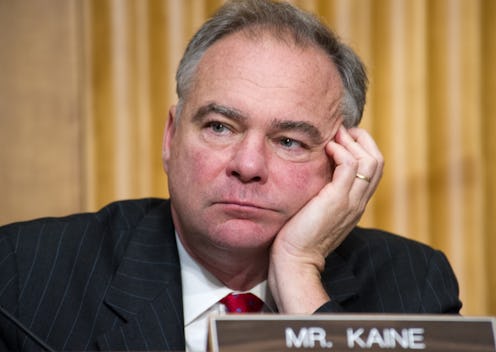News
Why Tim Kaine Is Clinton's VP Front-Runner
It may be a while until we know who Hillary Clinton’s running mate is, but one person has emerged as an early front-runner: Virginia Sen. Tim Kaine. Sure, he’s not a household name, and at least on the surface, he's a much less inspiring than Elizabeth Warren, Julian Castro, or many of the other names being floated as possible vice presidential picks. Nevertheless, there’s a good reason Tim Kaine is Clinton’s vice presidential front-runner: He’s the least risky choice of the bunch.
There are two schools of thought as to how a presidential candidate ought to choose their running mate. On the one hand, there’s the idea that vice presidential picks should “balance” out the ticket and compensate for the perceived shortcomings of the presidential candidate. A liberal candidate from the Northeast, for example, might put a conservative Southerner on the ticket, thus attracting a wider array of support in the general election.
The other school of thought holds that vice presidential picks, rather than providing a boost to the ticket, should simply “do no harm.” This might sound unambitious, but the ultimate purpose of a vice president isn’t to win an election; it’s to assume the presidency in case of an emergency. Furthermore, the wrong running mate can certainly hurt a party’s chances of winning, a lesson that George McGovern and John McCain learned the hard way during their respective campaigns.
There are merits to both schools of thought. But if Clinton subscribes to the second one — and there’s reason to think she will — Kaine is a far better pick than Warren, Castro, Sherrod Brown, Tom Perez, Bernie Sanders, or just about anyone else she might put on the ticket.
While Kaine is basically a boring white guy, he has very few weaknesses. Unlike Warren and Brown, he comes from a state with a Democratic governor, which means that if Clinton puts him on the ticket, she won't be sacrificing a Democratic seat in the Senate. Unlike Castro and Perez, Kaine is eminently qualified to be commander in chief, having served as both a governor and U.S. senator.
Kaine has a warm personal relationship with Clinton; the same can’t be said of Sanders or Warren. And then there’s the question of fundraising: Many of Clinton’s Wall Street donors have said they’ll keep their wallets closed if Warren is the vice presidential candidate, thanks to populist economic policies. Putting Kaine on the ticket would run no such risk.
In some ways, Kaine might even be an asset. For one, he’s from a swing state. Furthermore, his replacement in the senate would be appointed by Virginia Gov. Terry McAuliffe, a close friend and ally of the Clinton’s. These are additional incentives to put him on the ticket, but in general, Kaine’s biggest selling point is that doesn’t have any serious liabilities.
Now, the entire calculus would be different if Clinton was the underdog in this election. If that were the case, she’d have every reason to pick a flashy running mate, someone who’d excite the Democratic base, attract loads of media attention, and hopefully tilt the the race in her direction.
As it is, though, Clinton is already the heavy favorite to win in November. Because of that, she's much more likely to subscribe to the “do no harm” theory on running mates. And by that rationale, Kaine is far and away the smartest pick.
